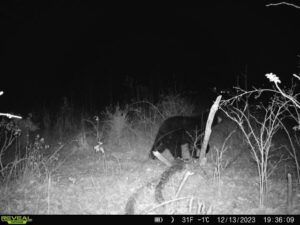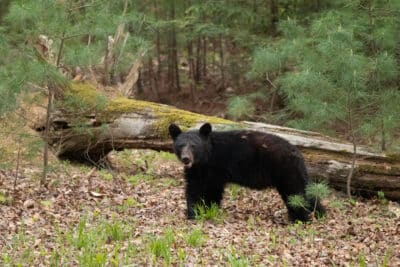 Black bears are North America’s most widely distributed bear species and can found throughout the United States as well as in Canada and Mexico. More specifically, they can be found right here in Willowsford! We are fortunate enough to have several sightings of a healthy black bears in Willowsford recently, so let’s take a minute and learn some facts about these beautiful creatures.
Black bears are North America’s most widely distributed bear species and can found throughout the United States as well as in Canada and Mexico. More specifically, they can be found right here in Willowsford! We are fortunate enough to have several sightings of a healthy black bears in Willowsford recently, so let’s take a minute and learn some facts about these beautiful creatures.
Adult black bears are about 4-7 feet long, nose to tail, and can weigh up to 500 pounds. The record for largest black bear was from North Carolina and weighed 880 pounds! Their normal diet includes mostly nuts, fruits, acorns, and insects but will eat meat and greens when their preferred foods are scarce.
Their senses have been fine tuned to their lifestyles. Black bears have excellent vision, hearing (twice the sensitivity of humans!), and they
have the best sense of smell of any animal in the world. Their nasal cavity contains millions of scent receptors that allows them to sniff out food, their cubs, a potential mate, and danger from miles away! When black bears are lean they can run approximately 30 miles/hour for short periods of time and are excellent swimmers and climbers!
Black bears are crepuscular, which means they are most active during dawn and dusk. Potentially taking a nap or two during the day. During their active hours, they will focus their energy on feeding and foraging. However, some black bears will venture out during the night to avoid humans or other bears.
During the colder months, October-January, bears are preparing to spend the winter in their dens. An adult male can gain up to 100 pounds in a few weeks if food is readily available. Black bears typically den in hollow trees, rock crevices, caves, brush piles and even man-made structures like culvert pipes. While they are denning, they won’t eat, drink, or even use the bathroom! Although, on a warm day they may emerge from their den briefly but will often return to denning until around mid-March to early May.

You might be wondering what you should do on the rare occasion you do see a black bear. First, remain calm! For the most part, black bears are not confrontational and are unlikely to attack, however, that does not mean you should approach them. When encountering a black bear, remain calm, typically yelling or making noise will frighten the bear and it will retreat. If you have a small child, pick up your child. Remember, do not turn and run away, slowly back away while remaining calm. If you have food present, don’t pick up the food as that could likely be what attracted the bear. Never get in between a bear and its cubs. Always warn others that a bear is present to avoid more encounters.
Remember, a bear doesn’t want to attack you; it typically just wants to be left alone to go about its business. Never try to approach a bear or its cubs, and if you know there are bears in the area remember to keep your pets on a leash. In general, black bears are very shy, and will likely retreat further into the woods before you even know it’s there. But always be respectful of our wildlife, never try to approach or feed a black bear should you encounter one.
If you happen to see a black bear and photograph it, please share it with our team at info@willowsfordconservancy.org!
